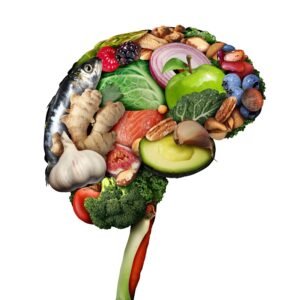The importance of a well-balanced diet in managing dementia cannot be denied. It boosts cognitive health and promotes overall well-being. In this brief, we are going to explore the significance of a healthy diet for dementia patients, one that is designed with a special focus on including memory-enhancing foods.
A Guide to a Healthy Diet For Dementia Patients
Understanding the connection between diet and cognitive function helps caregivers create a suitable meal plan for people who suffer from dementia.
How Diet Affects Dementia?

Nutrition’s impact on cognitive function is well established by research studies. Hence, it makes the dietary choices for patients suffering from dementia extremely important.
There exists certain evidence that suggests that certain dietary patterns can either promote brain health or contribute to cognitive decline.
Hence, if one can make informed food choices at the right time, enhancing memory, focus, and overall brain function seems a lot more realistic than it might otherwise. And in any case, leaving everything to meds is probably not the best idea either!
Brain-healthy nutrition is certainly the way forward.
Components of a Diet for Dementia

So, what are the components of a brain-boosting diet?
Well, nutrients that are known to benefit brain health must be in there; at the top of that list are Omega-3 fatty acids. Fatty acids are found in fish like salmon and trout. They have been associated with improved brain functions and a reduced risk of cognitive decline.
Then, the importance of antioxidants such as vitamins C, E and beta-carotene cannot be denied either. Antioxidants protect brain cells from damage that is often caused by free radicals.
Also, don’t forget folate, which is very important for cognitive development and maintenance. Folate is often present in leafy greens and legumes.
Also, dementia patients must drink an adequate amount of fluids throughout the day, even if they don’t express their thirst regularly.
Creating a Dementia-Friendly Diet Plan

Starting the day with a proper breakfast is important, especially for dementia patients. An example of a nutritious breakfast for dementia patients could be a bowl of oatmeal topped with berries and nuts.
Such a breakfast can serve as a rich source of antioxidants and omega-3 fatty acids. If this one sounds a little less appealing, then one can opt for scrambled eggs with spinach and whole grain toast as well, which has enough essential nutrients to start the day properly.
A well-balanced lunch must feature lean proteins, whole grains and vegetables to ensure cognitive support and sustained energy.
A diet for cognitive health, if you will have it that way! So what is it going to be? Well, we would say go with grilled chicken and steamed broccoli. Otherwise, you can fish with quinoa as well.
These types of meals can provide a very nourishing and satisfying meal for dementia patients. The idea is to include foods that are enriched with vitamins and minerals, elements that are so important for overall health and general well-being.
Dinners should be flavorsome and nutritious; the satiety value of a dinner meal must be adequate enough to ensure a proper night’s sleep.
Baked salmon with sweet potatoes and asparagus can provide a combination of brain-boosting nutrients and delicious flavors. The more variety there is, the greater the chance of dementia patients receiving a wide array of nutrients to support their cognitive health.
Special Considerations for Alzheimer ’s disease

Alzheimer’s diet for patients requires special consideration when it comes to nutrition. One of the best options for these patients is a Mediterranean diet. Key elements of a Mediterranean diet include fish, nuts, olive oil and fresh produce.
These elements are linked with a reduced risk of cognitive decline and Alzheimer’s disease. Healthy fats that support brain health are dominantly present in this diet.
It goes without saying that promoting a healthy diet throughout life can reduce the risk of developing Alzheimer’s disease and related dementias by a significant factor. Especially for females, the early signs of dementia in women necessitate a switch to a healthy diet for dementia patients straightway.
Final Thoughts – Healthy Diet For Dementia Patients
Well, folks, that would be all from this brief. There are more than 10 million new cases of dementia each year worldwide, indicating one new case every 3.2 seconds.
A healthy diet for dementia patients is essential. A balanced diet that is enriched with fruits, vegetables, whole grains, lean proteins and healthy fats can do wonders for long-term brain health, thereby minimizing the risk of dementia.
Of course, dementia care specialists can face plenty of challenges when it comes to providing a dementia diet to patients. Some of these eating problems challenges include difficulties with chewing, swallowing and changes in taste preferences, or in some cases, even a lack of interest in food.
It requires special effort to take care of vascular dementia and eating problems. But if one is patient, creative and flexible, these challenges can be easily overcome.
References
• Dominguez, L. J., & Barbagallo, M. (2018). Nutritional prevention of cognitive decline and dementia. Acta bio-medica : Atenei Parmensis, 89(2), 276–290.
• Gómez-Pinilla F. (2008). Brain foods: the effects of nutrients on brain function. Nature reviews. Neuroscience, 9(7), 568–578.












